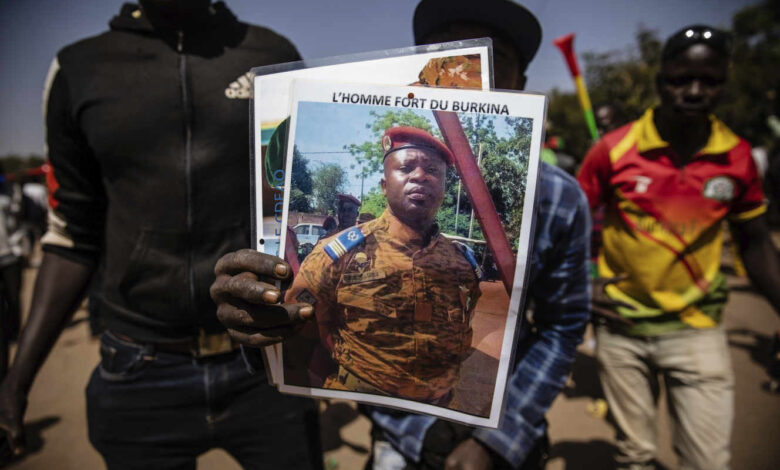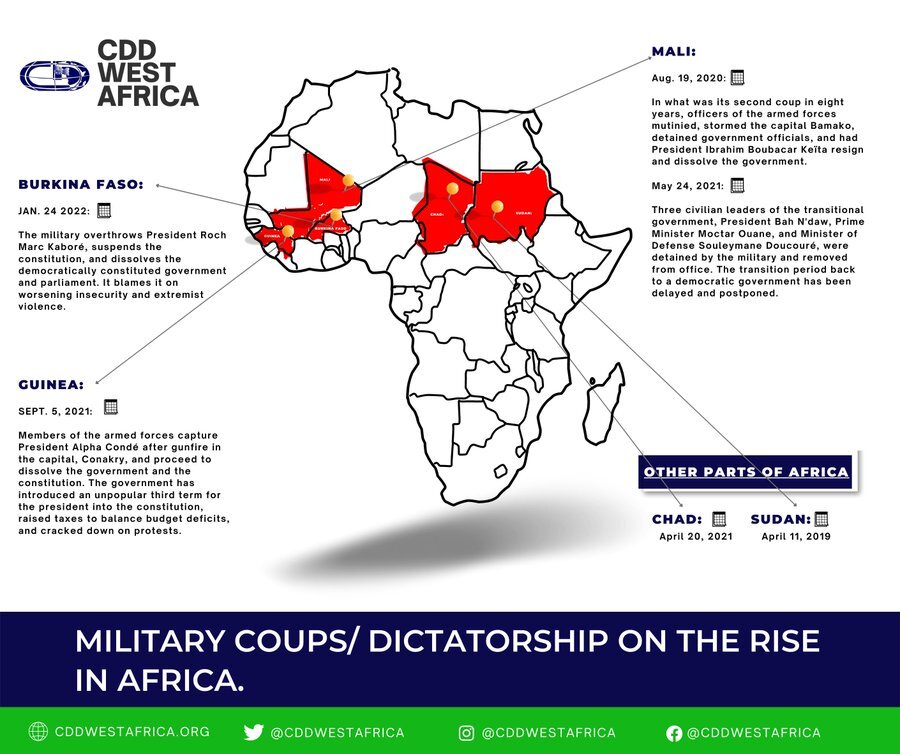
The recent power grabs by the military in African countries may not be unconnected with bad governance perpetrated by heads of civilian governments in the affected countries, making the citizens conflicted between brutal military regimes and authoritarian civilian governments.
On Jan. 24, 2022, the military deposed Burkina Faso’s President, Roch Kabore. Aside from dissolving the government (including the national assembly), they also suspended the constitution.
This came after two days of unrest at army camps in the country. The military claimed that the deterioration of the security situation and Kabore’s inability to unite the nation led to their actions.
HumAngle understands that the country has for years been battling with security challenges, inciting anger and resentment among soldiers who feel they are not adequately catered for in their fight against insurgency.
A week after the coup, they restored the constitution and named the coup leader, Paul-Henri Sandaogo Damiba, as the interim president.
It was the fifth in different African countries since 2019. The other four countries are Chad, Sudan, Mali, and Guinea.
Before its long-serving leader, Omar al-Bashir, was removed in 2019, Sudan had had the most coups and attempted takeovers amounting to 18, but only six were successful. Even Bashir came to power after a military coup in 1989.
The latest coup, which occurred on April 11, 2019, resulted from an economic disaster in the country. Residents’ protest was first against the rising costs of living but quickly widened into demands for the removal of President Bashir.
Lt. Gen. Awad Ibn Auf first took over power but was made to step down 24 hours after following the persistence of the protests. Lt. Gen Abdel Fattah was after that announced as the head of the transitional military council.
After weeks of agitations by protesters who expressed displeasure over the government’s management of insurgence, alleged corruption, and a floundering economy in Mali, the military took over power from President Ibrahim Keita on Aug 18, 2020. They detained several government officials, including Keita, who was forced to resign and dissolved the government.
On Sep. 21 2020, Bah Ndaw was announced as interim president. While the government is supposed to preside over an interim period of 18 months, the military removed him on May 24, 2021, saying it was necessary to end ‘decay in governance.’

Soon after the death of President Idris Deby, the military seized power in Chad on Apr. 20, 2021, installing the late president’s son, Mahamat as interim president.
The constitution of the country was subsequently suspended, with the justification that their actions were to maintain stability and to ensure a peaceful and democratic transition.
On Sept. 6, 2021, armed forces captured President Alpha Conde of Guinea after overnight gunfire exchanges, and Col. Mamady Doumbouya became Guinea’s interim president. The deposed leader had in the past put his faith in Doumbouya to help him keep his grip on power but he failed him.
Again, the military cited rampant corruption, disregard for human rights, and economic mismanagement as reasons for taking over from 83-year-old President Conde. Just yesterday, heavy gunfire was reportedly heard in the capital of Guinea-Bissau near the seat of the government.
While many reportedly sustained severe injuries, President Umaro Sissoco Embalo said hours later that “all is well” and that the situation is “under control”.
Embalo said on Wednesday that he survived the failed putsch, linked to decisions taken by him “notably to fight drug trafficking and corruption.”
But the African Union said it was concerned about what it described as an attempted coup and called on the military to free detained government members. The Economic Community of West African States (ECOWAS) also issued a statement saying it “condemns this attempted coup and urges soldiers to return to their barracks.”
HumAngle understands that the soldiers who led coups in these countries claimed “theft” and “bad governance” triggered their actions.
Though the Nigerian government claimed that the era of the military taking over the government is gone for good, the country is still battling with various forms of challenges including, insecurity, corruption, poverty, among others.
All of these make it fragile for the military to take over with the argument that they would uproot corrupt democratic leaders to welcome the coup’s ‘radical change.’
Fifteen of the 20 countries leading the 2021 Fragile States Index are in Africa. They include Somalia, Democratic Republic of Congo, Ethiopia, South Sudan, and Nigeria, witnessing violent internal conflicts for over a decade. As the battle against terrorists persists, ungoverned spaces litter the country, leading to underreported versions of terror.
Political leaders have also weakened democratic culture through their anti-democratic practices of ruling parties, but ECOWAS and AU are silent about this. They only speak up when the military steps in.
A study by Jonathan Powell, an associate professor at the University of Central Florida, and Clayton Thyne, a professor at the University of Kentucky, revealed that lack of concrete and unified international condemnation of corruption encourages more unconstitutional power grabs by the military.
It is, however, important to note that corruption is also deeply rooted in the affairs of the military, especially in countries like Nigeria, where they often misappropriate the funds given to them to fight wars.
From experience, the military cannot solve Africa’s democratic needs. Authorities need to ensure that Africans get the dividend of democracy. Else, the temptation by citizens to try something new will continue to lead to coups.
Support Our Journalism
There are millions of ordinary people affected by conflict in Africa whose stories are missing in the mainstream media. HumAngle is determined to tell those challenging and under-reported stories, hoping that the people impacted by these conflicts will find the safety and security they deserve.
To ensure that we continue to provide public service coverage, we have a small favour to ask you. We want you to be part of our journalistic endeavour by contributing a token to us.
Your donation will further promote a robust, free, and independent media.
Donate HereStay Closer To The Stories That Matter




